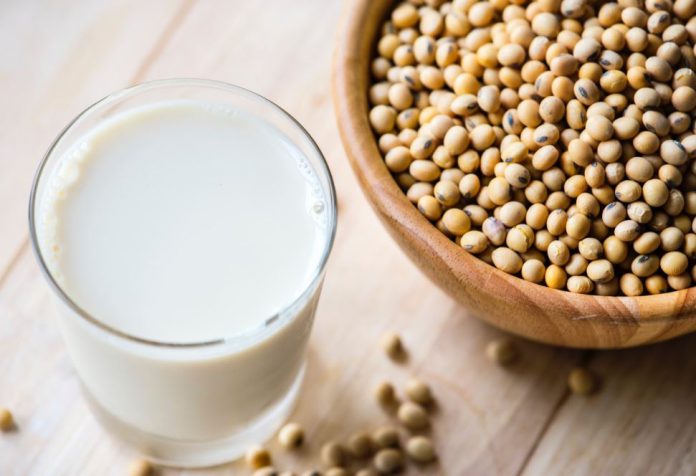Every parent, at one point or another, will spend a few minutes (or even hours) discussing the best milk. Whether it’s pregnancy milk for the expectant mom, the right milk for their new infant (of course, breast milk is best), or if growing up milk is still necessary after — milk talk and decisions regarding the best milk is somewhat a constant throughout every parenting journey.
Why is this so? Perhaps the main reason is the fact that milk contains vitamins and minerals that are essential for growing kids. Making it a must-buy for moms — especially those who are dealing with picky eaters. But with the number of milk options we currently have in the market, how do we decide what milk to serve to our kids?
One milk option that a number of moms and even some doctors recommend is soy milk. Although soy milk is not exactly new in the market, it’s relatively new in mommy circles and is usually recommended as a beverage for kids above 1 year old or as an alternative for kids with diagnosed IgE-mediated cow’s milk protein allergy.
If you’re considering whether soy milk is an alternative for your family, here’s everything you need to know about it:
Soy milk has a number of health benefits.
Just like any other milk, soy milk also offers a slew of benefits to drinkers. And the biggest and most acknowledged is that it serves as a legitimate alternative for kids who are lactose-intolerant, sensitive to lactose, or diagnosed with IgE-mediated cow’s milk protein allergy. Kids who might be incapable to handle or digest cow’s milk can handle soy milk just fine.
Another health benefit is that it’s considered low in fat and comparable to 2 percent milk. It has almost no saturated fats, no cholesterol, and is high in protein.
Soy milk also offers the right amount of calcium for your needs.
Dairy milk typically contains around 290 to 300 mg of calcium per serving. On the other hand, plain, all-natural, unfortified soy milk contains about 10 mg of calcium — albeit most commercial soy milk brands fortify their product as well, so the amount you will most likely get is around 150 to 300 mg of calcium per serving. Kids aged 1 to 3 years need around 700 mg of calcium, while kids aged 4 to 8 require around 1,000 mg of calcium per day. Granted that soy milk might contain a lesser amount per serving, we should also consider if our body can absorb most of it. In this case, studies have found that the calcium carbonate typically found in soy milk is just as readily absorbed as the naturally-occurring calcium that comes from cow’s milk. Not bad especially if cow’s milk is no longer a viable option due to allergies or other sensitivities. At the same time, if you do opt to serve soy milk to your kids, then you can also consider boosting her calcium intake with other calcium-rich food such as yogurt, cheese, and even calcium-fortified orange juice.
Soy milk can improve bowel movements in kids.
Studies have shown that compared to kids who drink cow-milk based formulas, kids taking soy milk have fewer instances of diarrhea and less frequent bowel movements — which can be attributed to soy milk’s fiber content.
Soy milk is an alternative for kids diagnosed with confirmed IgE-mediated cow’s milk protein allergy.
Studies show that around 7% of kids are diagnosed with cow’s milk protein allergy. Cow’s milk allergy is when a child’s body identifies the proteins in milk as harmful and then works hard against them. This can then lead to an allergic reaction that can include eczema, rashes, nausea, vomiting, abdominal pain, and even respiratory problems.
Cow’s milk allergy can then be diagnosed as either non-immunoglobulin E-mediated (non-IgE-mediated allergy) or immunoglobulin E-mediated (IgE-mediated allergy). The main difference between the two is that in the former, the child’s reactions or symptoms to the consumed milk occur slowly — within hours or days. While in the latter, the child’s reactions or symptoms manifest right after milk consumption.
Ultimately, soy milk can be considered a viable and legitimate milk alternative for kids, especially those diagnosed with IgE-mediated cow’s milk protein allergy. It allows them to enjoy all the milky benefits and goodness without the allergic reactions.
*Always seek the direct advice of a medical professional for any health issues or concerns. The use of any milk products for children 3 years old and up should always be upon the recommendation of your Pediatrician.
Published with Morinaga Nutrition.
References:
KidsHealth (kids calcium requirements), SFGate (calcium in soy milk), Livestrong (soy milk and bowel movements), Patient (milk allergy occurrence),
Are you a mom of kids with allergies? Then join our Ina-Allergy (Nanays vs Allergies) Community on Facebook for relevant information and support on dealing with allergies.





